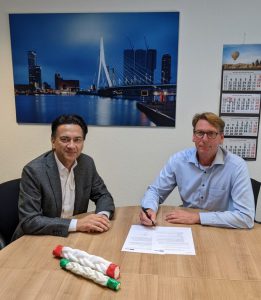 TEHO Ropes Europe and BioBTX have signed a non-binding Memorandum of Understanding to cooperate on the recycling of end-of-life mooring ropes used in shipping.
TEHO Ropes Europe and BioBTX have signed a non-binding Memorandum of Understanding to cooperate on the recycling of end-of-life mooring ropes used in shipping.
In the past months, BioBTX and TEHO ROPES Europe, together, have collaborated successfully in the upcycling possibilities of end-of-life mooring ropes into drop-in chemicals (also known as BTX), of which new, durable, and high-performance plastics can be produced. At TEHO Ropes, we always wants to offer our customers the best and most sustainable mooring solutions possible. By taking back the end-of-life mooring ropes and enabling their recycling, the maritime industry fulfils its obligation to society.
Teho International Inc Ltd (“TEHO International”) wholly owned subsidiary, TEHO EuRope B.V. (“TEHO ROPES Europe”) and BioBTX B.V. (“BioBTX”) wholly owned subsidiary, PCP B.V. (“PCP”) have signed a non-binding Memorandum of Understanding (“MOU”) to cooperate in recycling end-of-life mooring ropes for shipping. Both companies commit themselves to create a circular value chain in which the used mooring ropes from TEHO ROPES Europe is reused to produce high value drop-in chemicals by BioBTX.
In the past months, BioBTX and TEHO ROPES Europe, together, have collaborated successfully in the upcycling possibilities of end-of-life mooring ropes into drop-in chemicals (also known as BTX), of which new, durable, and high-performance plastics can be produced.
TEHO ROPES Europe, is a full range supplier of synthetic mooring ropes, steel wire ropes and mooring equipment, mainly servicing customers active in Maritime, Industry and Oil & Gas. TEHO ROPES Europe is committed to sustainability and wants to offer its customers the opportunity to recycle their mooring ropes at the end of their useful life. The recycling possibilities of mooring ropes are currently extremely limited, due to the varying compositions and constructions. These ropes often consist of distinct types of polymers, making it difficult in recycling them.
BioBTX, a leader in biobased aromatics and circular economy technology, has developed a technology to produce high value chemical building blocks from recycled materials and renewable sources. BioBTX expects to realise its first commercial scale plant named “PCP plant” at the chemical park of Delfzijl in Q3 of 2024. At this plant, a wide variety of renewable and recycled materials can be processed and mooring ropes have been identified to be a suitable feedstock for the plant. The BioBTX process is one of the few processes that can handle such complex feedstocks.
TEHO ROPES Europe aims to supply PCP up to 1,000 tonnes of end-of-life mooring ropes to the BioBTX plant, as one of the first contracted feedstocks. TEHO ROPES Europe and BioBTX will work together to maximise the volume of mooring ropes that will be recycled, thereby reducing the pressure on the environment of discarded plastic waste.
The collaboration of TEHO ROPES Europe and BioBTX contributes to the circular economy by eliminating waste and circulating materials and conforms to the United Nations Sustainable Development Goals 12, 13 and 14.
The MOU is subject to the agreement and signing by TEHO ROPES Europe and PCP of a detailed legally binding agreement before the end of Q1 of 2024.
Jan-Kees Noordhoek, managing director at TEHO ROPES Europe: ‘We always want to offer our customers the best and most sustainable mooring solutions possible. By taking back the end-of-life mooring ropes and enabling their recycling, the maritime industry fulfils its obligation to society. The collaboration with BioBTX is a notable example of how we can close the loop on material use.’
Ton Vries, Managing Director at BioBTX: ‘In order to reach a fully circular economy in 2050, we will need to make use of all different types of carbon resources to substitute for all the fossil resources used nowadays. The collaboration with TEHO ROPES Europe proves that circular solutions can already be realised if parties from different industries join forces. In this case it does not only prevent the plastic waste from growing, it also simultaneously substitutes the need for fossil-based resources.’
